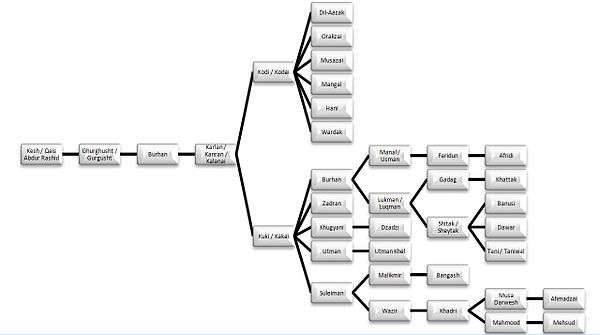Karlani
Karlāṇī (Pashto: کرلاڼي) is a Pashtun tribal confederacy.[1] The others being Sarbani, Gharghashti and Ghilji. They primarily inhabit the FATA region of North West Pakistan and certain parts of eastern Afghanistan.Ithe 16th century the Karlani founded the Karrani dynasty, the last dynasty to rule the Bengal Sultanate.
The legend of Karlani in the folklore[2] says:
"In his infancy he became an orphan and after losing his family he alone survived and was adopted by the Ormur Tribe. The tribe gave him shelter & protection & raised him like their own son. When he reached a marriageable age, the chief of the Ormur tribe made Karlan his son in law."[3] But actually He is not the son of Ghurghusht nor Ormur.[4]

Legacy
Karlan had two sons named Kodi and Kaki, then Kodi had two sons named (Dilzak) Dilazak and (Shamak Khan) Orakzai from whom the first branch of Karlani tribes descend.[4]
Tribes
About the karlani tribes, After explaining family trees of the other tribes' origins, Sir Olaf Caroe writes in his acclaimed book 'The Pathans': "And thus end the genealogies of the three sons of Qais. But where are such famous tribes as the Afridis, Khattaks, Orakzais. Where are the Bangash; Above all where are the Wazirs and Mahsuds.What of the Khaibar, and Waziristan, and the hills of Kohat."
Sir Olaf was greatly impressed by Pashtun culture during his tenure with the British government in British India.But he was especially intrigued by Karlani tribes.These were the tribes that were not subjected to rule by foreigners, these are the ones that refer to themselves by tribe rather then by race. For example "Mu Bangash, Mung Afridi, Mizh Wazir, Mizh Mahsud (We Bangash, We Afridi, We Wazir/Mahsud) etc. Instead of " Mung Pukhtana' (We Pathans). They speak the harder dialect of Pashto.(Although the dialects differ by region even among themselves).They predominantly inhabit the hills and are occasionally called hill tribes.
Actual Karlani tribes
- Rodbari
- Afridi
- Bangash
- Orakzai
- Mahsud
- Wazir
- Dawar
- Banusi
- Dilazak
- Khattak
- Khogyani
- Mangal
- Turi
- Utmankhel
- Wardak
- Zadran
- Zazi
Family tree
- Karlani
- Kodi
- Rodbari
- Dilazak
- Orakzai
- Musazai
- Mangal
- Hani
- Wardak
- Mayar
- Mirkhel
- Noori
- Kuki
- Burhan
- Usman (Afridi)
- Luqman (Khattak)
- Zadran
- Utman (UtmanKhel)
- Sikandar (Sikandar Khel)
- Zadran
- Khugyani
- zazi (Jaji)
- Utman
- Suleiman
- Malikmir (Bangash)
- Wazir
- Khadri & Lalai Wazir
- Musa Derwesh
- Uttman Zia & Ahmad Zai
- Muhammad Khan
- Muhammad Mahsud Khan
- Mubarak
- Gurbuz
- Shitak
- banusi (Settled in Bannu Division)
- Dawar (Settled in Mir Ali, Miranshah North Waziristan)
- Tanay (not to be confused with the Turkish-origin Tanoli/Taniwal)
See also
- Nimat Allah al-Harawi author of Tarikh-i-Khan Jahani Makhzan-i-Afghani also known as The History of the Afghans
- Amir Kror Suri
References
- ↑ "THe History of The Dilzak Tribe" (urdu) By Asarjan, First Edition_2011 p 68
- ↑ Life of the Amir Dost Mohammed Khan; of Kabul, Volume 1. By Mohan Lal (1846), pg.5
- ↑ History Of The Mohamedan Power In India by Muhammad Qāsim Hindū Šāh Astarābādī Firištah, The Packard Humanities Institute Persian Texts in Translation (retrieved 10 January 2007).
- 1 2 asarjan (2011), The History of Dilzak Tribe, pakistan: asarjan
6. "Alafghan Tanoli"(Urdu) By Ghulam Nabi Khan Tanoli, First Edition_2001